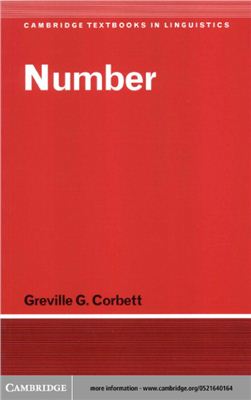Cambridge University Press, 2000 - Всего страниц: 358
Number is the most underestimated of the grammatical categories. It is deceptively simple yet the number system which philosophers, logicians and many linguists take as the norm - namely the distinction between singular and plural (as in cat versus cats) - is only one of a wide range of possibilities to be found in languages around the world. Some languages, for instance, make more distinctions than English, having three, four or even five different values. Adopting a wide-ranging perspective, Greville Corbett draws on examples from many languages to analyse the possible systems of number. He reveals that the means for signalling number are remarkably varied and are put to a surprising range of special additional uses. By surveying some of the riches of the world s linguistic resources this book makes a major contribution to the typology of categories and demonstrates that languages are much more varied than is generally recognised.
Number is the most underestimated of the grammatical categories. It is deceptively simple yet the number system which philosophers, logicians and many linguists take as the norm - namely the distinction between singular and plural (as in cat versus cats) - is only one of a wide range of possibilities to be found in languages around the world. Some languages, for instance, make more distinctions than English, having three, four or even five different values. Adopting a wide-ranging perspective, Greville Corbett draws on examples from many languages to analyse the possible systems of number. He reveals that the means for signalling number are remarkably varied and are put to a surprising range of special additional uses. By surveying some of the riches of the world s linguistic resources this book makes a major contribution to the typology of categories and demonstrates that languages are much more varied than is generally recognised.

